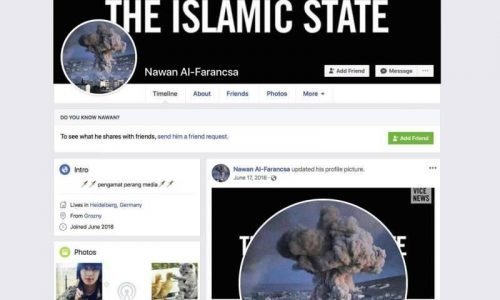
Facebook auto-generates videos celebrating extremist images
The animated video begins with a photo of the black flags of jihad. Seconds later, it flashes highlights of a year of social media posts: plaques of anti-Semitic verses, talk of retribution and a photo of two men carrying more jihadi flags while they burn the stars and stripes.
It wasn’t produced by extremists; it was created by Facebook. In a clever bit of self-promotion, the social media giant takes a year of a user’s content and auto-generates a celebratory video. In this case, the user called himself “Abdel-Rahim Moussa, the Caliphate.”
“Thanks for being here, from Facebook,” the video concludes in a cartoon bubble before flashing the company’s famous “thumbs up.”
Facebook likes to give the impression that it’s staying ahead of extremists by taking down their posts, often before users even see them. But a confidential whistleblower’s complaint to the Securities and Exchange Commission obtained by The Associated Press alleges the social media company has exaggerated its success. Even worse, it shows that the company is inadvertently making use of propaganda by militant groups to auto-generate videos and pages that could be used for networking by extremists.
According to the complaint, over a five-month period last year, researchers monitored pages by users who affiliated themselves with groups the U.S. State Department has designated as terrorist organizations. In that period, 38% of the posts with prominent symbols of extremist groups were removed. In its own review, the AP found that as of this month, much of the banned content cited in the study—an execution video, images of severed heads, propaganda honoring martyred militants—slipped through the algorithmic web and remained easy to find on Facebook.
The complaint is landing as Facebook tries to stay ahead of a growing array of criticism over its privacy practices and its ability to keep hate speech, live-streamed murders and suicides off its service. In the face of criticism, CEO Mark Zuckerberg has spoken of his pride in the company’s ability to weed out violent posts automatically through artificial intelligence. During an earnings call last month, for instance, he repeated a carefully worded formulation that Facebook has been employing.
“In areas like terrorism, for al-Qaida and ISIS-related content, now 99 percent of the content that we take down in the category our systems flag proactively before anyone sees it,” he said. Then he added: “That’s what really good looks like.”
Zuckerberg did not offer an estimate of how much of total prohibited material is being removed.
The research behind the SEC complaint is aimed at spotlighting glaring flaws in the company’s approach. Last year, researchers began monitoring users who explicitly identified themselves as members of extremist groups. It wasn’t hard to document. Some of these people even list the extremist groups as their employers. One profile heralded by the black flag of an al-Qaida affiliated group listed his employer, perhaps facetiously, as Facebook. The profile that included the auto-generated video with the flag burning also had a video of al-Qaida leader Ayman al-Zawahiri urging jihadi groups not to fight among themselves.
While the study is far from comprehensive—in part because Facebook rarely makes much of its data publicly available—researchers involved in the project say the ease of identifying these profiles using a basic keyword search and the fact that so few of them have been removed suggest that Facebook’s claims that its systems catch most extremist content are not accurate.
“I mean, that’s just stretching the imagination to beyond incredulity,” says Amr Al Azm, one of the researchers involved in the project. “If a small group of researchers can find hundreds of pages of content by simple searches, why can’t a giant company with all its resources do it?”
Al Azm, a professor of history and anthropology at Shawnee State University in Ohio, has also directed a group in Syria documenting the looting and smuggling of antiquities.
Facebook concedes that its systems are not perfect, but says it’s making improvements.
“After making heavy investments, we are detecting and removing terrorism content at a far higher success rate than even two years ago,” the company said in a statement. “We don’t claim to find everything and we remain vigilant in our efforts against terrorist groups around the world.”
But as a stark indication of how easily users can evade Facebook, one page from a user called “Nawan al-Farancsa” has a header whose white lettering against a black background says in English “The Islamic State.” The banner is punctuated with a photo of an explosive mushroom cloud rising from a city.
The profile should have caught the attention of Facebook—as well as counter-intelligence agencies. It was created in June 2018, lists the user as coming from Chechnya, once a militant hotspot. It says he lived in Heidelberg, Germany, and studied at a university in Indonesia. Some of the user’s friends also posted militant content.
The page, still up in recent days, apparently escaped Facebook’s systems, because of an obvious and long-running evasion of moderation that Facebook should be adept at recognizing: The letters were not searchable text but embedded in a graphic block. But the company says its technology scans audio, video and text—including when it is embedded—for images that reflect violence, weapons or logos of prohibited groups.
The social networking giant has endured a rough two years beginning in 2016, when Russia’s use of social media to meddle with the U.S. presidential elections came into focus. Zuckerberg initially downplayed the role Facebook played in the influence operation by Russian intelligence, but the company later apologized.
Source: Phys





